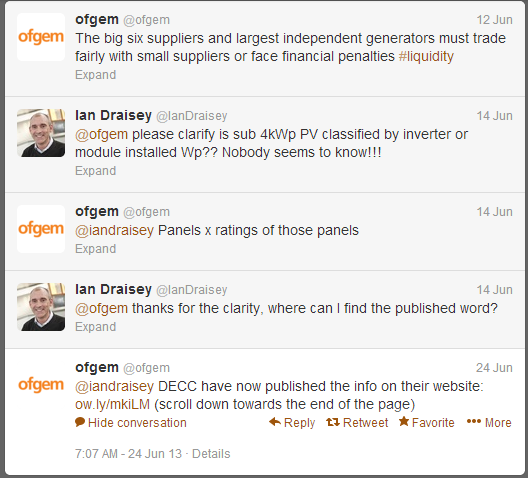T
TedM
This has cropped up elsewhere (Navitron) so I thought I would highlight it here.
OFGEM have recently (24th July) issued a new version of their Feed-In Tariff Guidance for Suppliers version 5.2.
In this they have provided a new clarification of the definition of Total Installed Capacity (TIC) for PV systems:
Footnote 10 is a reference to supporting information from DECC who have also 'clarified' this issue:
https://www.gov.uk/government/polic...ogies/supporting-pages/feed-in-tariffs-scheme
where they say:
This in my, and others, opinion does not align with the definition of TIC that is used in the legislation for FiTs in that it excludes the inverter from the calculation. Additionally, in another document relating to the use of second-hand kit, OFGEM have made it clear that the inverter is included as part of a PV system (they have chosen the wording in that document extremely carefully seeking to make that definition only apply to the use of second-hand equipment).
OFGEM have recently (24th July) issued a new version of their Feed-In Tariff Guidance for Suppliers version 5.2.
In this they have provided a new clarification of the definition of Total Installed Capacity (TIC) for PV systems:
http://www.ofgem.gov.uk/Sustainabil...icensed electricity suppliers Version 5.2.pdf3.9. The definition of TIC is given in Schedule A to Standard Licence Condition 33. TIC for Solar PV is calculated by multiplying the rated output of the solar PV modules used by the number of modules[SUB]10[/SUB]
Footnote 10 is a reference to supporting information from DECC who have also 'clarified' this issue:
https://www.gov.uk/government/polic...ogies/supporting-pages/feed-in-tariffs-scheme
where they say:
How Solar PV Total Installed Capacity (TIC) is calculated in the Feed-In Tariff Scheme
- The Feed-in Tariff policy determines generation tariffs based on technology and the Total Installed Capacity (TIC) of the installation
- In the case of PV, the TIC is calculated by multiplying the rated output of the solar PV modules used by the number of modules
- We are aware that there are other ways to calculate the TIC of a system (such as using the inverter rating), however, the above method is the only applicable approach for the purposes of determining eligibility of PV installations within the FITs scheme
- We have decided on this approach as it minimises the potential for fraudulent activity and is in line with the manner with which we developed the FIT PV tariffs
- The Declared Net Capacity (DNC) is relevant in determining the route of accreditation (MCS or ROOFIT) an installation must take when applying for the FIT scheme – for further details on MCS Certification contact MCS and for ROOFIT accreditation see Ofgem’s generator guidance document
This in my, and others, opinion does not align with the definition of TIC that is used in the legislation for FiTs in that it excludes the inverter from the calculation. Additionally, in another document relating to the use of second-hand kit, OFGEM have made it clear that the inverter is included as part of a PV system (they have chosen the wording in that document extremely carefully seeking to make that definition only apply to the use of second-hand equipment).


 )
)






